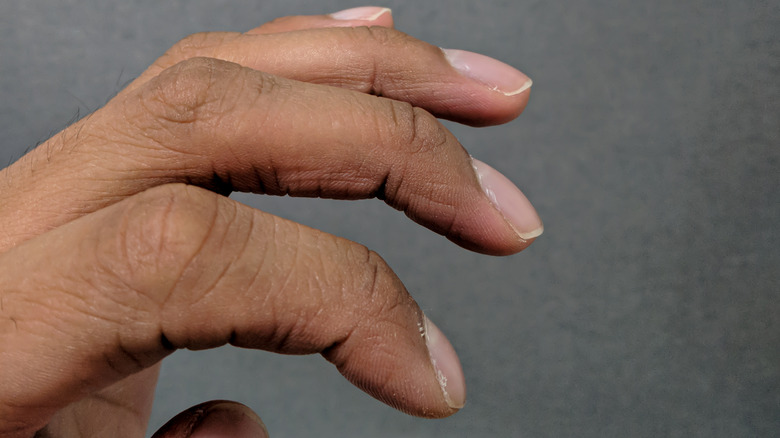Warning Signs From Your Lungs You Shouldn't Ignore
Your chest isn't feeling quite right. Is it a lung infection or just a minor ailment? There are so, so many sneaky signs of lung trouble that many of them seem completely unrelated and easy to ignore. Lung cancer and chronic obstructive pulmonary disease (COPD) are so often written off as merely a smoker's problem or a disease that impacts the elderly, but that's just not the full picture, according to the American Cancer Society.
"Lung cancer seems to be increasing in young people in their thirties and forties who have never smoked a day in their life," Dr. Michael Wert, pulmonary disease and critical care specialist with Ohio State University Wexner Medical Center, told Everyday Health.
Are you aware of all the early and hidden signs of lung trouble? We want to keep you in the know and help you breathe easy, so we've laid out a list of symptoms to watch for.
You're getting a ton of colds
You've been a rock all your life but you've been inundated with colds lately. You're sick of being sick and you just can't seem to bounce back like you used to. What gives?
According to a study published in StatPearls, adults typically get a common cold about two to three times a year. "During that time, it takes the immune system three to four days to develop antibodies and fight off pesky germs," Dr. Nadia Hasan, a physician at Delancey Internal Medicine, told Penn Medicine. "If you have an underlying lung issue or if you're under a lot of stress or dealing with a significant life event," Dr. Andrea McKee, chairman of radiation oncology at the Lahey Hospital & Medical Center in Massachusetts, told The Healthy, "you're more prone to developing a bacterial infection on top of your cold."
If you're getting repeated colds, then your immune system is telling you something: it's overworked! The underlying reason could be anything from allergies to stress to lung disease. Make boosting up your immune system a priority to get it back to tip-top shape (via Penn Medicine).
Your shoulder aches even when you're resting
Got a painful shoulder from a pulled muscle? No problem. But if you're experiencing persistent shoulder pain with no apparent cause and it feels worse when you're lying in bed, well, that's just strange! It might be what's called "referred pain," which is pain that is felt in one part of the body but is actually coming from another (via Best Life). It could be arthritis. And although the chance is small, it might also be a sign of lung cancer. "Shoulder pain associated with early-stage lung cancer may occur from tumor pressure on nerves," explained patient advocate and registered nurse Gail Trauco to Best Life.
Malignant mesothelioma, a cancer in the lung from asbestos exposure, and bone metastases, which is cancer that's spread to the bones, can also lead to persistent shoulder pain. And if the pain includes muscle weakness, and facial flushing or sweating, it may be from a Pancoast tumor, a rare lung cancer primarily experienced by exposure to cigarette smoking, according to the Moffitt Cancer Center in Florida.
You have painful breathing
Every breath you take feels like you're being stabbed in the chest. Coughing or just moving around are intensely uncomfortable. This painful condition, called pleurisy, is inflammation of the lung's outer lining. Founding Father Benjamin Franklin died from complications of the condition, according to The Franklin Institute. Most cases of pleurisy are brought on by viral or bacterial infections like bronchitis or the flu, according to the NHS. But life-threatening causes include blood clots in the lungs, mesothelioma, and lung cancer.
"Your lungs are a delicate machine," Dr. Raed Alalawi, a pulmonologist at Banner University Medical Center in Phoenix, told Banner Health. "Any disturbance can create a chain reaction which often include inflammation," explained the site. "It's important that you get your discomfort evaluated so that the underlying cause can be identified. After all, pleurisy is just a symptom."
Your fingernails look blue
If you've got blue nails and it's not from nail polish, you likely have what's called cyanosis. We're not talking about a lone bruised nail from kicking your toe into a table leg. No, this is when all the fingernails or toes are tinged blue. Cyanosis of the nail bed is caused by low oxygen levels in the blood. It can be a short-term effect from poor circulation in cold weather, or a more worrisome signal of COPD, asthma, pneumonia, or even a blood clot in the lung (pulmonary embolism), according to Medical News Today.
"[Cyanosis] is a symptom of an underlying condition rather than being a disease in itself," Dr. Ananya Mandal, an associate professor at Nil Ratan Sircar Medical College and Hospital in Kolkata, India, told Best Life. If the blue color isn't just from frigid temperatures, "your physician will probably want to do a simple rapid-blood gas analysis to measure the oxygen in your blood and perhaps some tests to check your heart and lungs," Dr. Andrew Weil, the director of the Andrew Weil Center for Integrative Medicine, told the publication.
You're dropping pounds but not trying to
When your clothes are getting looser and the number on your scale keeps creeping suspiciously downward, don't ignore it if you haven't actively changed something in your diet or lifestyle. If you've been under stress, or just recovering from a stomach bug, then it's likely just a temporary issue. But if there's nothing you can pinpoint, then dropping pounds without intention is your body telling you something's off.
The experts at the Mayo Clinic say if you've lost more than 5% of your body weight in six to 12 months then you should talk with your doctor, and especially so if you're 65 or older. You may have an overactive thyroid, an infection, or even lung cancer, particularly if you've been a smoker (via Healthline).
"It's not common to lose a significant amount of weight without an obvious reason," Dr. Anne Cappola, an endocrinologist and professor of medicine at the University of Pennsylvania, told Prevention. "If you're losing weight and nothing's changed with your diet or activity, you need to worry about that a little bit."
You're wheezing up a storm
Have you taken a deep breath and heard a high-pitched whistle? You may detect it only when you exhale, inhale, or both. What you're experiencing is wheezing and it's what happens when your airways have narrowed due to some type of blockage, inflammation, or tightening of the muscles (via MedicineNet). Wheezing is a common problem that can be brought on by allergies or a viral respiratory infection like bronchiolitis. But it can also be from chronic conditions such as COPD, heart failure, asthma, and lung cancer, reports Healthline.
"Wheezing is very much like the sound from a deflating balloon when you make it squeal by stretching the outlet," James Grotberg, professor of biomedical engineering and surgery at the University of Michigan, told University of Michigan News. "An asthmatic lung airway is similar because it is constricted to a small narrow passageway. The pitch you hear is the frequency of oscillation of the balloon material, which for a lung would be the airway tube made of cells."
You feel exhausted all the time
Finding it hard to get out of bed? Are you groggy throughout the day and your brain feels like it's in a fog? If you know you just haven't been getting enough hours of sleep, or your circadian rhythms have been disrupted from a schedule change, well then it's easy to self-diagnose. But if those lifestyle changes aren't the issue, then what is?
Vitamin deficiencies, depression, anemia, hormonal conditions, and heart and lung diseases can all be a source of feeling exhausted, according to Medical News Today. Fatigue is also a hallmark sign of COPD, a progressive condition. Most people with COPD have both emphysema and chronic bronchitis, making breathing very challenging. Cigarette smoking is the main cause of the disease, according to the American Lung Association.
"If you are getting the right amount of sleep, paying attention to sleep hygiene, and still feeling exhausted in spite of those things, then it's definitely time to talk to your doctor to figure out what is going on," Dr. Katherine Green, medical director of the Sleep Center at UCHealth in Aurora, Colorado, told Real Simple. "Fatigue is a symptom with a very wide range of causes."
Your phlegm is out of control
It's not exactly a nice topic of conversation, but let's talk about phlegm. It's that nasty stuff that you cough up that comes in a variety of colors. Phlegm is mucus that's produced by the lungs and lower respiratory tract. It's what you expel and it means that inflammation is present (via Centers for Respiratory Health).
"Clear phlegm is normal. It's made of water, salt and other cells," Dr. Barbara Kreel, a board-certified specialist in otolaryngology with Geisinger Medical Center in Wilkes-Barre, Pennsylvania, told Geisinger Health. "When you become sick, the phlegm may thicken as well as change color as your body fights off the infection."
Healthline reports that even the seemingly innocuous white phlegm can be indicators for bronchitis, COPD, or GERD. When not a one-time thing, red or pink phlegm may "signal conditions like tuberculosis or a pulmonary embolism," Dr. Kreel warned.
You have strange bumps on your skin
If you feel a strange bump on the back of your neck or back, it's probably no cause for concern. However, it is true that lung cancer may show up as, you guessed it, mysterious small bumps on your skin. A 2015 study revealed that up to 12% of lung cancer patients develop these skin metastases. Lung cancer is the second most common cancer in both men and women, mainly in those 65 and older, and it's the leading cause of cancer deaths, according to the American Cancer Society.
"If lung cancer spreads to distant organs, it may cause lumps near the surface of the body, due to cancer spreading to the skin, or to lymph nodes [collections of immune system cells] such as those in the neck or above the collarbone," reports the American Cancer Society via Britain's Daily Express. The bottom line: Don't ignore those odd bumps or lumps. Always have your doctor check them out.
Your voice sounds different
Does your voice sound deep and raspy? It's a common complaint that happens with allergies, colds, or even GERD. Singers, actors, and others who use their voice professionally can get a hoarse voice from overuse. But if yours doesn't seem to have any cause and is accompanied by other symptoms, there just might be something going on with your lungs.
So why would your voice have anything to do with lungs? It's because the laryngeal nerve runs through the chest and to the lungs. Pressure from a tumor can press on that nerve, according to Healthline, and can give you that croaky-sounding voice. While many benign things can cause prolonged hoarseness, so can some serious maladies such as lung cancer, according to Johns Hopkins Medicine.
Dr. Yin Yiu, an ENT specialist in laryngology at Houston Methodist, told the hospital's site, "If you're losing your voice regularly or if your voice doesn't return to normal after a few weeks, it's time to consult a laryngologist (ENT voice specialist). He or she can investigate whether it's a sign of a larger, more serious medical issue."
Your fingertips have changed
It's called clubbing, but it's not the kind with music and dancing. This condition makes the tips of your fingers or toes bulge and your nails take on an extreme curve like a cat's nail. It's not entirely clear what causes clubbing, but it's usually a sign of lung cancer or another disease (via Verywell Health).
Hippocrates, the Greek physician known as the "father of Western medicine" first described the medical condition nearly 2,500 years ago, a report in Lung India revealed. Even today, many refer to clubbed digits as Hippocratic fingers (via Verywell Health). Though somewhat shrouded in mystery, the condition is linked to a lack of oxygen in blood vessels which triggers additional vascular endothelial growth factor and the growth of more blood vessels, according to WebMD.
Dr. Eric Presser, a board-certified thoracic surgeon with First Choice Physician Partners in California, told Health, "Any good doctor who sees someone has clubbing will know that they may have some sort of lung disease, heart disease, or gastrointestinal disease."
Your cough won't go away
Whether it's a persistent tickle or a bone-rattler, coughing is one of the most common reasons for seeing a doctor, per Harvard Health. Many things can cause persistent coughing, including post-nasal drip, blood pressure medicines, COPD, cancer, or even heart failure. If a cough has been plaguing you for more than three weeks, it is considered chronic, according to Healthline.
Board-certified radiation oncologist Russell Hales told Johns Hopkins Medicine, "While every cough or case of bronchitis isn't a reason to believe you have lung cancer, if you are at high risk of developing lung cancer, paying attention to the early warning signs is critical."
According to the CDC, smokers have the highest risk. Cigarette smoking is the number one risk factor for lung cancer in the United States. Although to a lesser extent than current smokers, former smokers are also more prone to the disease compared to never-smokers. Lighting up has been linked to 80% to 90% of lung cancer deaths, and cancers in other parts of the body. The second leading cause of lung cancer may surprise you. It's radon exposure. You can't see it or smell it, so it makes radon especially insidious. But don't worry — radon can easily be tested and mitigated in your home, per the American Cancer Society.
You feel off balance and dizzy
Like a boat in a turbulent storm, you feel unsteady. If it lasts for more than a few seconds, it's unsettling. The likely culprit could be just an inner-ear infection, according to Keck Medicine of USC. But if you have a persistent feeling of unbalance combined with other symptoms, you may be looking at something else, including the possibility of lung disease.
Coughing is the most common complaint of lung cancer sufferers, but a lesser-known symptom is balance problems. This occurs when lung cancer has spread to other parts of the body, such as the brain (via Everyday Health). Small cell lung cancer (SCLC) accounts for up to 15% of all lung cancers, reports the American Cancer Society. It may instruct your immune system to strike out at your nervous system, which results in balance problems, according to WebMD. With pulmonary hypertension, a host of symptoms, including balance issues and dizziness, can slide under the radar because of similarities with other diseases such as asthma, COPD, and heart disease, per Boulder Community Health.
"Many people have pulmonary hypertension for a long time before they realize something is wrong," board-certified pulmonologist S. Clark Berngard told Boulder Community Health. "Luckily, there are many available treatment options and more on the horizon."
You're coughing up blood
If you see some blood on your tissue after coughing, it may send you into a tailspin. Is it from bleeding gums? A cut in your mouth? Something in your throat? A nose bleed? Or could it be the big "C"? If you've had a few days of hard coughing from bronchitis and see some frothy blood-streaked sputum or a few specks of bright red blood, then irritated airways is the most likely problem, says the NHS. But as always, it's a good move to talk to your doctor right away because even a small amount of blood should never be ignored. Many common and benign reasons can cause it, but blood can be a warning sign of a clot or even lung cancer (via MedicineNet).
"The most concerning color to watch out for in mucus is red. If you cough up blood, that means there could be damage to your lungs, and you should see a doctor," according to UNC Health Talk. "This is different from a hint of blood in mucus from your nose, which most likely means a small blood vessel has ruptured from the stress of coughing, sneezing and blowing your nose. If you can't tell if the blood is coming from your mouth or nose, see a doctor."















